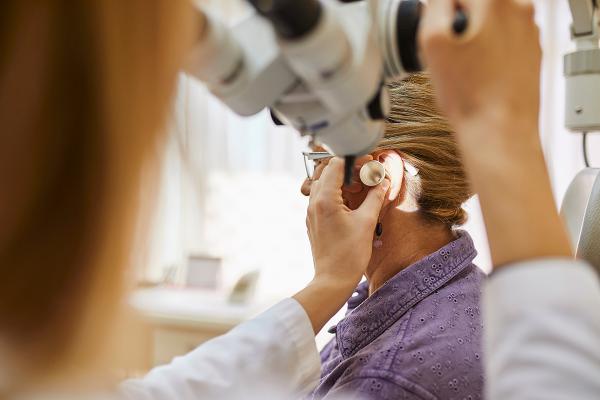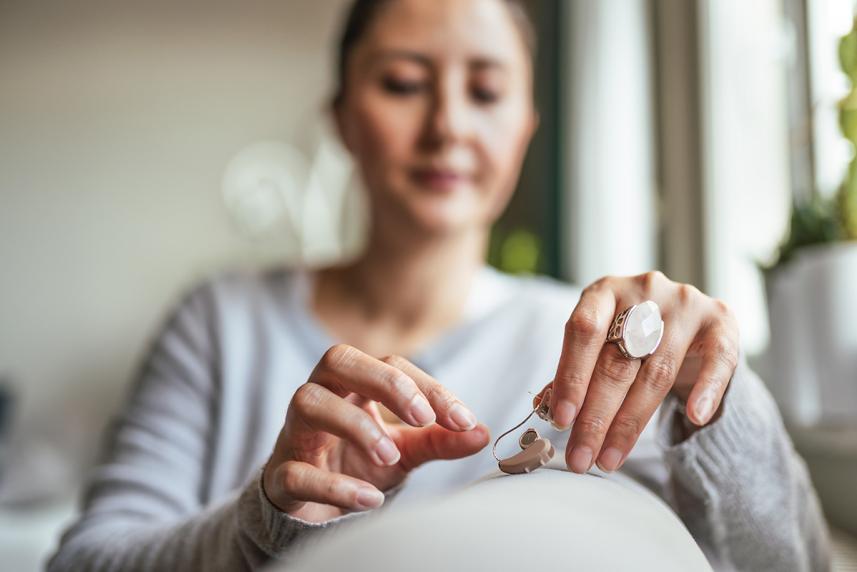
AARP Hearing Solutions helps members access hearing care professionals, no-cost hearing exams and more.
This problem could be caused by battery issues, connection problems and more. Find out what to do next.

Usually, your hearing aids work fine from the moment you put them in until you take them out before bed. But let's say one of your devices starts shutting off during the day. What’s going on?
This glitch could happen from time to time with some devices, according to Monica Murray, Au.D. She is vice president of program development at UnitedHealthcare Hearing and the expert in our Ask an Audiologist series.
Luckily, there are some ways you can troubleshoot the problem at home, says Murray. Here’s what could be causing the issue, plus expert tips on what to do.

AARP Hearing Solutions helps members access hearing care professionals, no-cost hearing exams and more.
Most hearing aids have Bluetooth connectivity, which allows you to pair (connect) them with your smartphone.1,2 This lets you stream phone calls, music or podcasts directly to your hearing aids.2
If one of your hearing aids turns off while you’re streaming, your devices may be incorrectly paired. “Try pairing them again, because maybe one of them isn’t connected to Bluetooth,” says Murray.
It could be that one of your hearing aids is not getting a full charge when you place it in the charging station at night. Then the next day, the battery drains quickly and the device turns off.
That might happen if the hearing aid is not making a good connection with the charger contacts, says Murray. Or you don’t have the hearing aid positioned correctly in the charger.
“Make sure that the contacts on your charger are free of debris,” says Murray. If they’re dirty, that can interfere with charging. And get in the habit of wiping your hearing aids with a clean cloth each night too.
Pro tip: If you do discover that your hearing aid’s battery has drained, you can put your device back in the charger for 30-45 minutes. You’ll get a quick boost that might take you through the rest of the day.
Most hearing aids have a wax guard on the end of the receiver. This is a tiny mesh cap that fits underneath the receiver’s dome and protects the hearing aid from getting clogged with earwax.
Excess earwax won’t actually cause your hearing aid to turn off, notes Murray. But if your device is clogged, you could definitely notice intermittent sound issues. Things may sound weak or even dead. “Your device probably needs to be cleaned,” she says.
Wax guards are easy to change at home (your hearing aids likely came with a supply).
Do you live in a hot, humid area of the country? Moisture droplets from the air could seep into the small components in your hearing aid, Murray says. Or maybe you dropped your hearing aid into the sink or wore it in the shower by mistake.
Today’s hearing aids are pretty water resistant, so your device might be OK.3 But damage can happen sometimes. If a device gets wet, “it may not work optimally,” Murray says.
Try placing the hearing aid in a dry-aid kit or dehumidifier. You could also leave your device in a sunny place in your home to dry out.
What if you tried all of these steps, and one of your hearing aids continues to turn off while you’re wearing it? Then it’s time to bring your device to your hearing care professional. They can evaluate what’s going on and make adjustments or repairs.
A wire could be loose, for example. And that’s not something you want to mess with at home. You would definitely want an expert to fix it, says Murray. Remember: Your hearing care professional is ready to help when your devices aren’t working right.
Ready to request a hearing exam and consultation? AARP® Hearing Solutions™ has a national network of hearing care professionals. Request an appointment.
Sources
Information is for educational purposes only and is not a substitute for the advice of a licensed medical provider. Consult your provider prior to making changes to your lifestyle or health care routine.
AARP Hearing Solutions is available to all AARP members and does not require a health insurance plan from UnitedHealthcare. The AARP hearing program discount cannot be combined with any other discounts, promotions, coupons or hearing aid benefit plans unless noted herein. Products or services that are reimbursable by federal programs including Medicare and Medicaid are not available on a discounted or complimentary basis. AARP commercial member benefits are provided by third parties, not by AARP or its affiliates. Providers pay a royalty fee to AARP for the use of its intellectual property. These fees are used for the general purposes of AARP. Some provider offers are subject to change and may have restrictions. Please contact the provider directly for details. UnitedHealthcare Hearing is provided through UnitedHealthcare, offered to existing members of certain products underwritten or provided by UnitedHealthcare Insurance Company or its affiliates to provide specific hearing aid discounts. This is not an insurance nor managed care product, and fees or charges for services in excess of those defined in program materials are the member's responsibility. UnitedHealthcare does not endorse nor guarantee hearing aid products/services available through the hearing program. This program may not be available in all states or for all group sizes. Components subject to change.
Network size varies by market.